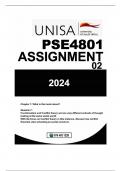, PSE4801 ASSIGNMENT 02 2024
Chapter 1: What is this book about?
Question 1
Functionalism and Conflict theory are two very different schools of thought looking at the same
social world.
With the focus on Conflict theory in this instance, discuss how conflict theorists view schooling
as social construct. (10)
Conflict theorists view schooling as a social construct that perpetuates and maintains social
inequality and power dynamics within society. According to conflict theory, education is not just a
means of transmitting knowledge and skills, but also a way in which the ruling class maintains its
dominant position over the working class. Schools are seen as institutions that teach and reinforce
the values, norms, and beliefs of the dominant class, while also perpetuating a system of inequality
and social stratification.
One aspect of conflict theory's view on schooling as a social construct is the concept of the "hidden
curriculum." This refers to the unspoken and often implicit messages that students receive in school,
which serve to socialize them into accepting and reproducing the existing social order. For example,
students are taught to obey authority, follow rules, and compete with their peers, all of which are
skills that benefit the ruling class in maintaining their power and control.
Additionally, conflict theorists argue that the education system perpetuates inequality through the
unequal distribution of resources and opportunities. Schools in wealthier neighborhoods tend to
have better funding, more resources, and higher quality teachers, while schools in poorer areas
often struggle with limited resources and lack of access to quality education. This perpetuates a
cycle of poverty and social inequality, as students from disadvantaged backgrounds are less likely to
receive a quality education and therefore less likely to break out of their social class.
In conclusion, conflict theorists view schooling as a social construct that perpetuates and reinforces
social inequality and power dynamics within society. The education system is seen as a tool that
serves the interests of the ruling class, while also contributing to the continuation of social
stratification. This perspective offers a critical analysis of the role of education in society, highlighting
the ways in which it perpetuates and maintains existing power structures.
References:
1. Bowles, S., & Gintis, H. (1976). Schooling in Capitalist America: Educational Reform and the
Contradictions of Economic Life. Basic Books.
2. Bourdieu, P., & Passeron, J. C. (1977). Reproduction in Education, Society, and Culture. Sage
Publications.
3. Apple, M. W. (2004). Ideology and Curriculum (3rd Ed.). Routledge.
Question 2
Elaborate on the interpretivist approach and how shared meanings influence how the individual
interprets and interacts in a particular social context. (10)




